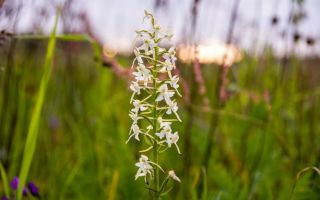Content
The beneficial properties of Lyubka two-leaved are used in the treatment of inflammatory and colds. The plant has few contraindications, but before using it, one way or another, you need to study its features and important nuances.
What it looks like and where it grows
Two-leaved Lyubka (Platanthera bifolia) is a perennial herb of the Orchid family. It is also found under the names of cuckoo's tears and night violet, it has two undivided root tubers up to 60 cm in size.
The basal leaves of the plant are located almost opposite at the surface of the earth and are narrowed into a petiole at the base, their shape is oblong-ovoid. Stem plates are smaller, sessile and lanceolate. Lyubka blooms with white-greenish small buds, collected in rare cylindrical spikelets. Fruiting occurs in August and September.
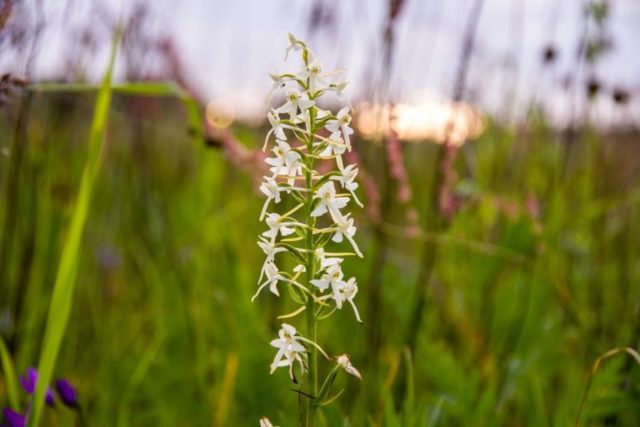
Night violet is widespread throughout Europe, found in the Caucasus and Asia Minor. You can see it in Russia in Western and Eastern Siberia, in Altai, in the central regions. Two-leaved Lyubka chooses light coniferous and mixed forests, forest edges and clearings, prefers scanty but moist soils.
Chemical composition
The medicinal benefits of two-leaved lyuba are due to its chemical composition. The plant tubers contain:
- potassium oxalate;
- starch and sugar;
- a large amount of mucus - up to 50%;
- essential oils;
- bitterness;
- amino acids;
- mineral salts.
Due to the listed valuable substances, the plant has good anti-inflammatory and cleansing properties.
Useful properties of two-leaved lyubka
In folk medicine, mainly double-leaved tubers are used - they contain the maximum amount of valuable substances. With proper use, medicinal raw materials:
- envelops the mucous membranes of the stomach and intestines and relieves inflammation;
- helps with diarrhea and abdominal pain;
- has a good effect on nervous exhaustion and stress;
- due to the diuretic action, relieves edema;
- promotes the elimination of toxins and cleanses the liver;
- helps with inflammation of the urinary tract;
- relieves fever with flu and colds;
- helps with cramps and relieves toothache;
- improves the condition of prostatitis in men;
- stops bleeding in dental diseases and hemorrhoids;
- promotes expectoration with a strong cough;
- accelerates recovery from angina.
Two-leaved lyubka is used in the treatment of gynecological inflammations, used to treat wounds, cuts and abscesses.
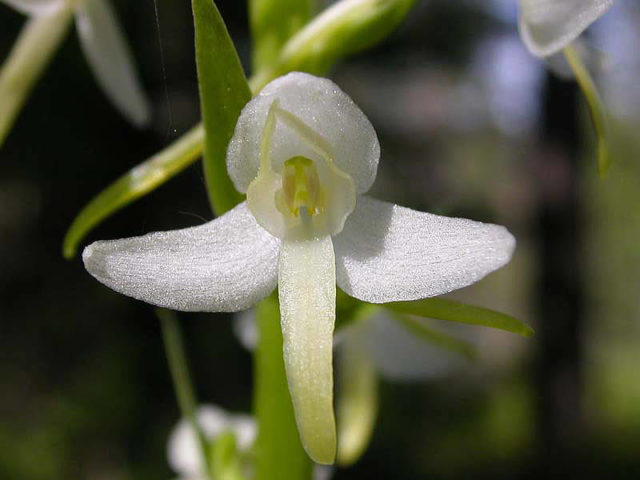
Preparation and application methods
Basically, traditional medicine uses two-leaved tubers for the preparation of decoctions and infusions. Also, from medicinal raw materials, you can make a wine tincture with good strengthening properties.
Decoction
An aqueous decoction of two-leaved lyubka helps with peptic ulcers, diarrhea and pancreatic malfunctions. The remedy is prepared as follows:
- Dry night violet tuber is ground to a powder in a volume of 100 g.
- Dilute raw materials with 200 ml of boiling water and stir until dissolved.
- The resulting mass is poured into 1.8 liters of hot water.
- Leave under the lid to infuse for half an hour.
A viscous mass, similar to jelly, is consumed 50 ml four times a day.
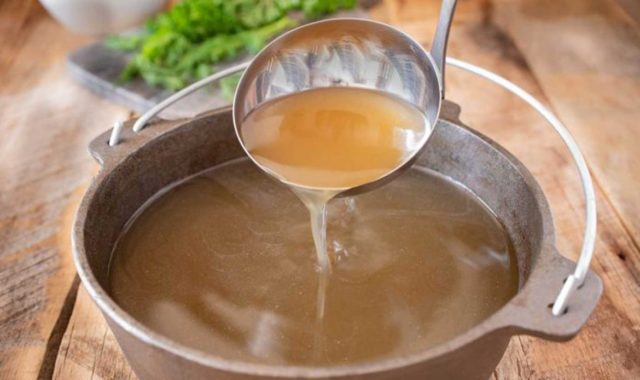
Tincture
Tincture of two-leaved lyubka is prepared with red wine. The recipe looks like this:
- 40 g of dry tubers are crushed and poured into 500 ml of red wine.
- In a closed vessel, remove for a week in a dark place.
- Shake regularly throughout the infusion.
Ready tincture is taken in 50 ml up to three times a day for colds and anemia. It is not necessary to filter the product, the sediment contains many useful substances and is of great value.
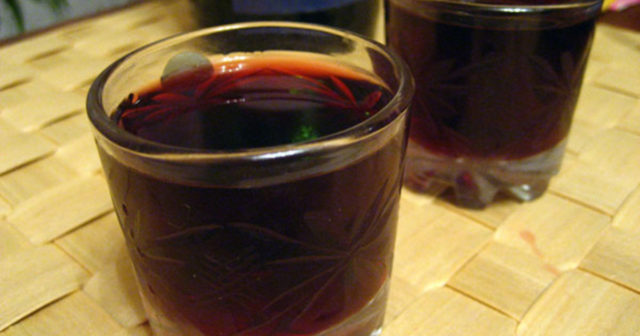
Application of a double leaf
Traditional medicine uses double-leaved lyubka for nervous disorders, colds, inflammation and poisoning. The plant is relatively harmless and suitable for use in case of serious ailments.
With a breakdown
Double-leaved lubka is good for nervous overstrain, stress and chronic fatigue. For medicinal purposes, the following strengthening infusion is prepared:
- 10 g of powder from dry tubers are poured into a thermos.
- Pour 500 ml of hot milk.
- Leave covered for ten hours.
At the end of the period, the infusion is filtered. You need to drink it on a full stomach, 10 ml three times a day, the whole treatment continues for two weeks.
In case of poisoning
In case of food poisoning and indigestion, double-leaved lubka helps relieve intestinal cramps and normalize stools. Traditional medicine offers the following recipe:
- Dried tubers are ground into powder.
- 1 g of raw material is measured and poured into a glass jar.
- Pour 100 ml of boiling water and shake under the lid for ten minutes.
The agent, together with the sediment, must be taken in 20 ml every four hours throughout the day. The treatment continues until the patient feels normal.
With cystitis
The anti-inflammatory properties of double-leaved lyubka relieve discomfort with cystitis and normalize urination. For therapy, such a medicine is prepared:
- 2 g of powder from the tubers of the plant are poured with 2 ml of alcohol or vodka.
- Add 40 ml of boiling water to the gruel in stages, stirring constantly.
- Give the finished mixture a little brew.
The resulting medicine should be divided into four servings and consumed throughout the day.
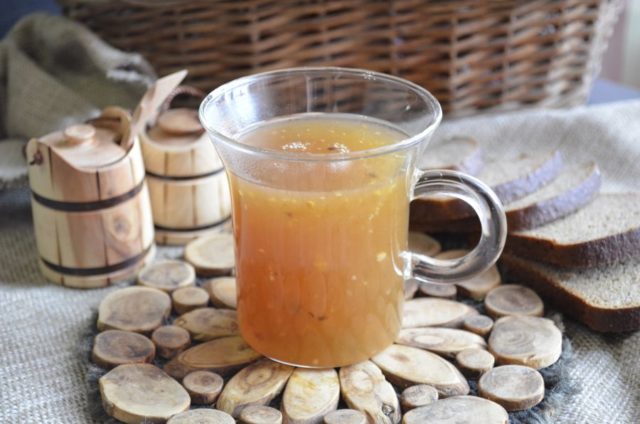
For toothache
Double-leafed lube can be used for toothache. The algorithm looks like this:
- A thin plate is cut from a fresh tuber.
- Knead her lightly with a knife so that she lets out the juice.
- A piece is applied to a sore tooth.
You need to keep such a compress until the discomfort disappears.
With the flu
Two-leaved lubka has good antipyretic properties and helps with fever. The following remedy can be used to relieve the temperature:
- 10 g of powder from a dry plant tuber is poured into 250 ml of hot milk.
- Close the container with a lid and shake well for several minutes.
A homogeneous viscous mixture must be divided into two equal parts and drunk in small sips per day.
With herpes
Two-leaved Lyubka fights well against viruses and infections. To get rid of herpes, you can prepare the following ointment:
- Tuberous dry rhizomes are ground into powder.
- Dilute 10 g of raw material with warm water to obtain a soft creamy paste.
- Let the product sit for 15 minutes.
The finished mixture is applied to the affected areas of the skin and left for half an hour. You need to use the ointment twice a day until complete recovery.
With ARVI
Double-leafed lubka with ARVI helps relieve nasal congestion and eliminates general weakness. The following decoction is prepared for treatment:
- Dried tubers of the plant are ground in an amount of 5 g.
- Pour raw materials with 250 ml of boiling water.
- Stir thoroughly and shake the mixture.
- Simmer over low heat on the stove for 20 minutes.
The finished broth must be cooled. In unfiltered form, it is taken three times a day, 5 ml.
With boils and wounds
For abscesses, abscesses and inflamed wounds, compresses with the roots of a double-leaved lyuba are beneficial. A remedy for external use is done as follows:
- 20 g of dried or fresh tubers are boiled until softened in 250 ml of liquid.
- The processed raw materials are crushed to a homogeneous slurry.
The resulting product is applied to the sore spot and covered with a soft, clean bandage. The compress needs to be kept for two hours, and the procedure is carried out enough once a day.
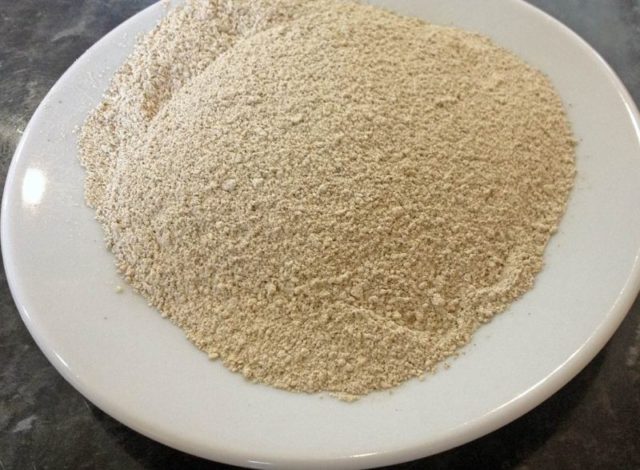
With bronchitis
Two-leaved lubka promotes expectoration in bronchitis and fights bacterial processes. To get rid of a lingering cough, you should prepare the following remedy:
- 5 g of dry crushed tubers are poured into a glass of heated chicken broth.
- Mix and add 15 ml of dry red wine.
The drink should be taken on a full stomach four times a day, 100 ml. The remedy will not only help to cope with a cough, but also restore the reserve of strength.
With enterocolitis
The soothing and anti-inflammatory properties of bifacial lyuba are in demand for intestinal colitis. To normalize digestion and relieve pain, make the following decoction:
- 2 g of dry raw materials are poured with a glass of boiling water.
- Stir until smooth and heat for 15 minutes over low heat.
- Remove from the stove, cool and filter.
You need to take the remedy three times a day for a large spoon. Drink the broth on an empty stomach.
With prostatitis
To get rid of prostatitis, traditional medicine advises men to use flowers of a double-leaved lyubka. The medicinal infusion is done as follows:
- 100 g of dry or fresh buds are poured into 1 liter of vegetable oil.
- Leave for two weeks in a warm, shaded place.
- Pass the product through cheesecloth.
- 5 ml of the resulting preparation is diluted with 50 ml of pure water.
- Beat until a homogeneous emulsion is obtained.
In a warm form, a healing agent is used for microclysters. The procedures are carried out every evening for two weeks. Lyubka has a particularly good effect while taking anti-inflammatory drugs.
Contraindications
An important feature of a two-leaved lyubka is its harmlessness - the plant has very few contraindications. Night violet-based products are not recommended for:
- with hypertension;
- with chronic insomnia;
- with a tendency to nervous overexcitation;
- during pregnancy and lactation.
For the first time, decoctions and infusions of two-leafed lyubka are tried in small quantities and with caution to make sure that there is no allergy. If skin rashes, nausea or diarrhea appear, the plant treatment is stopped immediately.
Collection and procurement
Collecting double-leaved lyubka for medicinal purposes is carried out from early to mid-summer. Flowers are harvested during the decorative period, the tubers need to be dug out while the plant gives arrows. They choose a dry and warm day for collection, for a night violet they go to an area located at a distance from large settlements, highways and factories. The place where lyubka grows must be environmentally friendly, otherwise many harmful components will be present in the tubers of plants.
The rhizomes extracted from the ground are thoroughly washed in running water from contamination, it is also recommended to rinse the flowers from dust. Then the raw materials are laid out in a thin layer on a baking sheet. The tubers can be cut into slices and strung on a string to hang from the ceiling. Drying is carried out in a warm, but protected from direct sunlight place with good ventilation. You can also use an oven or dryer, setting the temperature to no more than 50 ° C.
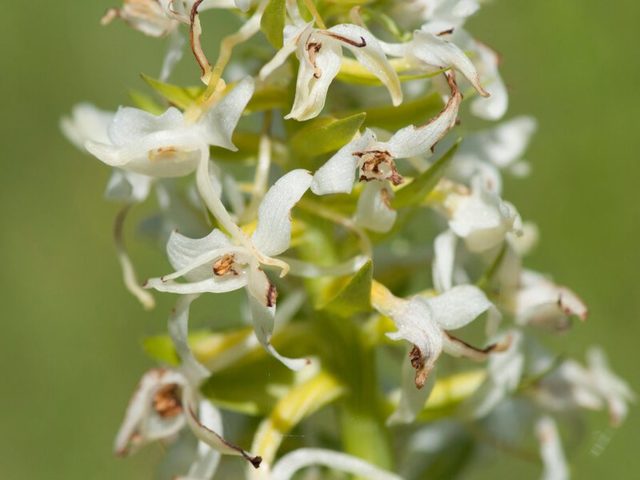
The magical properties of the night violet
Folk omens endow the double-leaved lyubka with mystical properties. It is believed that the plant ignites passion and arouses love, helps to attract the attention of the right person and improves relations between spouses. In magic, double-leaved lyubka is used in love spell rituals and in the preparation of appropriate potions.
Conclusion
The beneficial properties of Lyubka bifolia make it especially valuable for gastric and intestinal inflammation. Decoctions and infusions based on the plant have strong enveloping qualities, soften irritated mucous membranes and contribute to their rapid recovery.

